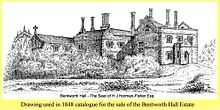Bentworth Hall
| Bentworth Hall | |
|---|---|
 Bentworth Hall in 2012 | |
 Location within Hampshire | |
| General information | |
| Location | Bentworth, Hampshire |
| Country | England |
| Coordinates | 51°08′52″N 1°03′00″W / 51.147778°N 1.05°W |
| Completed | 1832 |
Bentworth Hall is a large country manor in the parish of Bentworth in Hampshire, England. It is about 1 mile (1.6 km) south of the centre of Bentworth and about 4 miles (6.4 km) northwest of Alton, its nearest town. The previous Bentworth Hall (or Bentworth Manor House), now called Hall Place, was built in the early 14th century and is a Grade II listed building 100m South of the village green. The present day Bentworth Hall is surrounded by woodland and was built in 1832. This was after Roger Staples Horman Fisher purchased the Bentworth Manor estate and built a new mansion about 0.8 miles (1.3 km) south of the previous Bentworth Hall.


History
In 1832, the Bentworth Hall estate of about 500 acres was sold at Garraway’s Coffee House in London by the Fitzherbert family to Roger Staples Horman Fisher for about £6000. The Fitzherberts were relatives of Maria Fitzherbert, the (illegal) wife of the Prince Regent, later George IV (illegal because Maria Fitzherbert was a Roman Catholic and banned by Act of Parliament from marrying into the Royal Family). Horman Fisher then started building the current Bentworth Hall on what was then open downland about 1km to the south at 51°8′52″N 1°3′0″W / 51.14778°N 1.05000°W, access being from an 800 metre private drive from the Bentworth-Medstead road.[1]
In 1848 the Bentworth Hall estate was sold to Jeremiah Robert Ives, including the Old Manor House (now Hall Place) and the 1832 Bentworth Hall.[2] The Ives family later included George Cecil Ives who lived for a time at Bentworth Hall with his widowed mother, Emma. In 1890, her son, Colonel Gordon Maynard Gordon-Ives built and lived in Gaston Grange, about 1.2km to the East of Bentworth Hall.
In 1897, Emma Ives died and ownership of the Bentworth Hall estate passed to Colonel Gordon-Ives who continued to live at Gaston Grange, renting Bentworth Hall to W. G. Nicholson, a Member of Parliament. Colonel Gordon-Ives died 8 September 1907 and the estate passed to his son, Cecil Maynard Gordon-Ives, a Captain in the Scots Guards in the 1914-18 war, who occupied it until his death on 23 July 1923.[3] The Bentworth Hall Estate, then of 479 acres, was offered for sale by John D Wood & Co in 1924 and again by them in 26 June 1930, when an A. Willis purchased it,[4] and after this, Major John Arthur Pryor lived at Bentworth Hall until the estate was taken over by the military during the Second World War.[5]
In 1947, the Bentworth Hall estate was bought by Major Herbert Cecil Benyon Berens, who was a director of Hambros bank in London from 1968.[6] In 1950, Major Berens built two new lodge houses at the junction of the drive to Bentworth Hall with the main road through the village towards Medstead. Later, parts of the Bentworth Hall estate were sold to local farms, and some clearing of trees and hedges produced larger fields that were easier to crop.
Major Berens died at Bentworth Hall on 27 October 1981 and after this the remaining estate was put up for sale.[7] It was first offered as a single property and then as several, Bentworth Hall and its outbuildings being divided into five separate "dwelling units" which is the position today.
References
- ↑ Smith, Georgia (June 1988). Bentworth: the making of a Hampshire village. Bentworth Parochial Church Council. pp. 52–55. ISBN 978-0-9513653-0-4. Retrieved 19 February 2012.
- ↑ Burke, Bernard (1858). A Genealogical and Heraldic Dictionary of the Landed Gentry of Great Britain and Ireland. Harrison. p. 618. Retrieved 15 February 2012.
- ↑ Inscription on the Gordon-Ives grave in Bentworth Churchyard
- ↑ Country Life. Country Life, Ltd. 1978. Retrieved 14 February 2012.
- ↑ Burke, Sir Bernard; Pirie-Gordon, Charles Harry Clinton (1937). Genealogical and Heraldic History of the Landed Gentry: Founded by the Late Sir Bernard Burke. Shaw. Retrieved 14 February 2012.
- ↑ Grossman, David (1972). Who's Who in British Finance. R. R. Bowker Co. Retrieved 14 February 2012.
- ↑ "Obituaries in 1981". ESPN. Retrieved 14 February 2012.
| ||||||||||||||||||||||